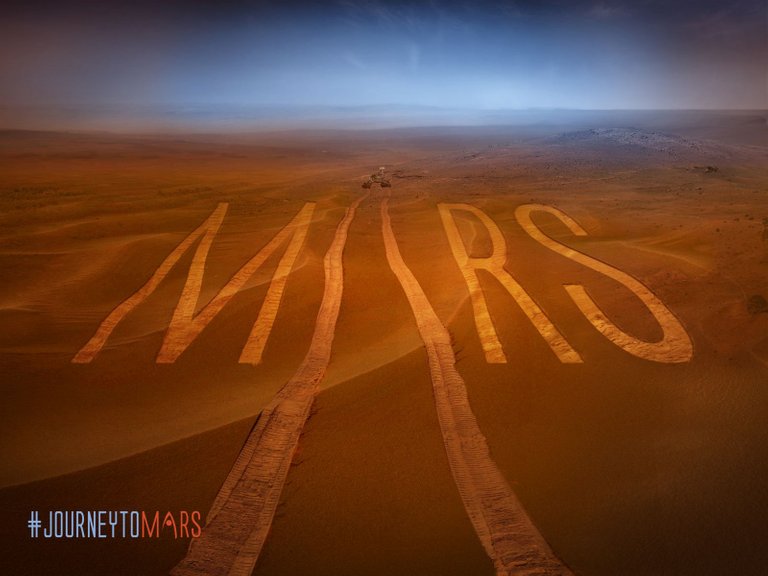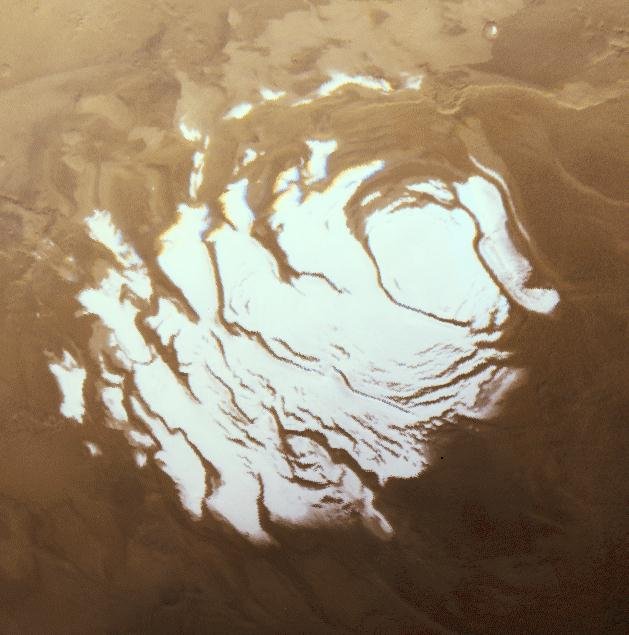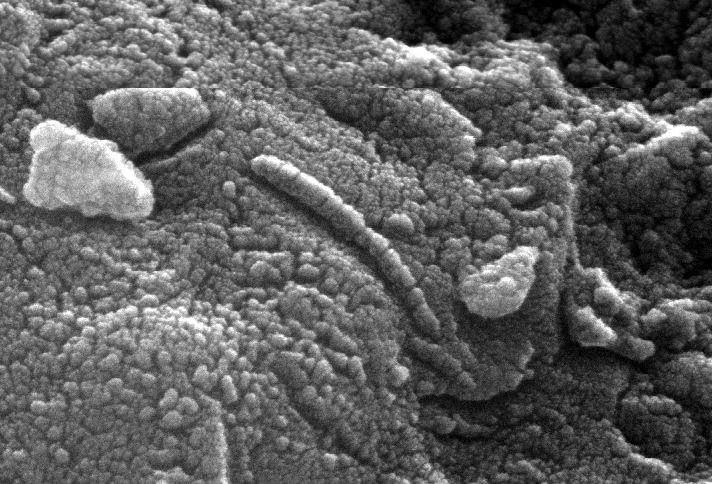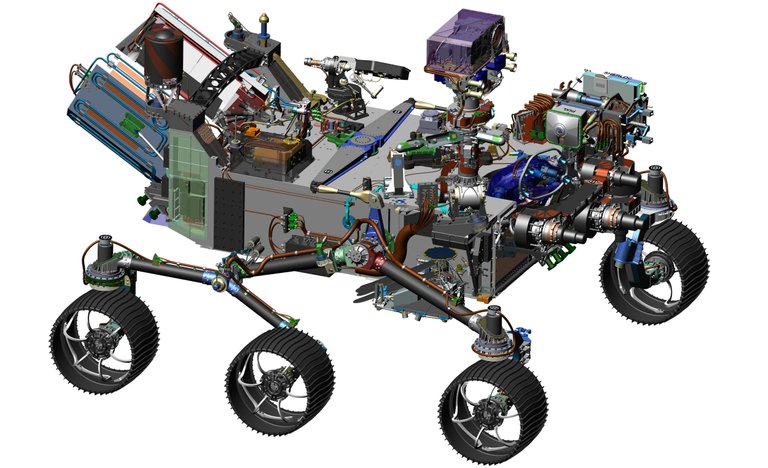
Source
In his 1971 hit single the late great David Bowie posited the question: is there 'Life on Mars'?
History
Being one of our nearest neighbours Mars has always held a fascination for mankind and probes have been sent there since 1960, the first successful fly-by of the planet was achieved by NASA in 1965 with the Mariner 4. It has been proven notoriously difficult to successfully land on the Martian surface, many missions ending in disaster with the craft sent smashing into the planet or failing to make contact with Earth. The European Space Agency sent the British Beagle 2 lander in 2003 but it was not heard from after release. In 2015 NASA's Mars Reconnaissance Orbiter (MRO) eventually found Beagle 2 had landed successfully but failed to fully deploy it's solar panels and antenna.

Source
Our current understanding for the prerequisite of life is that water is one of the key ingredients - our knowledge based on the only life we know - here on Earth. The theory that Mars had water was developed hundreds of years prior to the space race: observers such as William Herschel saw the white polar caps and clouds above the planet and pronounced that Mars had
The dark areas of Mars appeared to change with the Martian seasons. The Italian astronomer Giovanni Schiaparelli thought that it was vegetation and in 1877 reported what he claimed were canals meandering across the red planet's surface. Further, Percival Lowell made the astounding claim that these canals were built by Martian inhabitants to draw water from the poles. Below you can see one of Schiaparelli's Martian maps depicting the 'canals'.

Source
By the 20th century astronomers agreed that the temperature on Mars was much colder than initially thought, being 50% further from the Sun – somewhere around -55c / -67F – and although it only has a mass some 11% of the Earth our galactic neighbour experiences seasons, due to it's axial tilt of 25.2 degrees. A day is 24 hours and 40 minutes long but due to it's distance from the Sun a year on Mars lasts 687 days. We now understand that the polar caps comprise of frozen CO2 – carbon dioxide - with a layer of frozen water below.

Source
A not so great atmosphere
The Martian atmosphere is much lower than here on Earth, measured at 600 pascals compared to our 101,000 Pa and it is mainly comprised of carbon dioxide but small amounts of methane have also been detected. Although clouds have been observed on Mars they are mostly comprised of very fine particles of dust picked up by the Martian wind, reflected by the Sun.

Source
It is theorized that Mars once had an atmosphere very much like our own and that up to a third of it's surface was covered in a liquid ocean. Geographic formations resembling ancient shorelines have been documented and investigated by Mars rovers such as the most successful to date, Curiosity.
Launched in November 2011 Curiosity landed near 'Mount Sharp' in the Gale Crater in August 2012. Originally planned to last just 2 years this little rover is still going strong today. Curiosity's mission is to gather data to assess if Mars ever had an environment habitable by microbial life. Regular Tweets are put out by NASA on Curiosity's Twitter Page
If Mars did indeed have a more Earthlike atmosphere in it's ancient past, the supposition is that either a cataclysmic event such as a huge meteor stike rendered it barren or that the Sun slowly stripped the atmosphere and caused a runaway greenhouse effect.

Source
Extremowhatnow?
An extremophile is a microorganism here on Earth that lives in the extremes of heat, pressure, ph levels, radioactivity and salinity. Everywhere we look on Earth, from the deepest oceans, inside rock or ice and even radioactive waste disposal sites we find these hardy microbes. They have even been known to survive the harshness of outer space on the outside of returning space craft. Given our current knowledge of Mars' atmosphere, the frozen ice caps and signs of briny water it does not seem unreasonable to assume that life could have existed on Mars and perhaps still does.

Source
So no little green men?
Perhaps we already have proof of life from Mars: a 4.5 billion year old rock was discovered in Antarctica in 1984 designated ALH84001. The meterorite is said to have been dislodged from Mars by a huge meteor impact around 16 million years ago, falling to earth some 13,000 years ago. Under microscopic investigation it was determined that this piece of rock was formed on Mars over 3.6 billion years ago. What appear to resemble organic molecules have been found deep within the rock suggesting biological activity. Even more astounding was what look like microscopic fossils, pictured below.

Source
The future
Curiosity's mission is ongoing, slowly trundling across the barren red landscape. NASA is planning it's next mission to Mars to launch in the summer of 2020, arriving at it's destination the following year in February. This mission is similar to Curiosity wherein it will investigate an ancient environment of Mars which may have been favourable for microbial life. The 2020 rover will collect and seal samples, caching them on the surface ready to be returned to Earth in a future mission. NASA currently plans to send it's first manned mission to Mars in the 2030s. Prior to this preparations are under way and a Dutch organisation called Mars One is crowd sourcing a project to send humans on a one way trip to the red planet by 2024 in order to set up a permanent human settlement on Mars.

Source
Thank you for reading

Great post, very informative. Perhaps our whole solar system is spinning away from the sun at such a slow pace it is indiscernible to us, Mars may have been very Earth like over 4 billion years ago, or even as recent as 16 million years ago, and we would have no proof of it. Time is a very vast beast that consumes all.
Thank you!
Very profound. We pale into insignificance in the vastness of time and space. Space is big, really really big. We occupy just a small corner of a fairly boring galaxy.
Still is kind of nice to have the corner to ourselves.
We should think more about saving our planet than moving to a new one imo :)
Agreed. Too bad everyone has a different goal from everyone else. :(
This is the kind of EPIC content Steemit deserves.
Thank you for saying so 👍
Superb post...informative and thought provoking.
Thank you for your kind comments. It makes it all the more worthwhile
didn't just upvote, I saved it! I love it!!
Thank you! I appreciate it. More to follow ;)
yay! :D I love NASA related subjects, I have the ISS (International Space Station) app on my phone, to see what's happening live in space! :D
Do you go outside to catch it like I do sometimes? I know, I'm a geek
No you're not! Or, well...I am too !!! :D Haha, of course I do!!! :D
Haha :-)
This post received a 3% upvote from @randowhale thanks to @gmuxx! For more information, click here!
Thank you!
Thanks for being on Steemit! Enjoyed the post.
Join us on chat. There is, also, a #help channel that can answer any Steemit related questions.
I've been searching for this post, thank you!
Thank you for your comment, I hope you enjoyed the read
Really good post, thanks for taking the time to write it, it was incredibly b interesting.
Thank you!
I trust you read the first 2 parts? ;-)
I have to you the truth, not yet, Mars just really interests me, but I will do, I promise :-)
Good. I'd hate to think your education was missing out :p